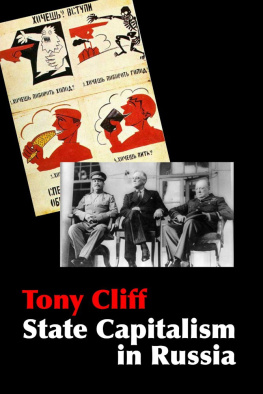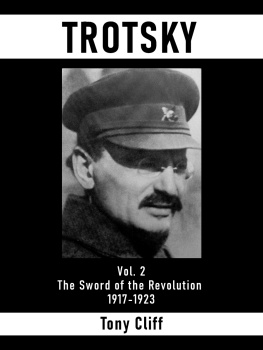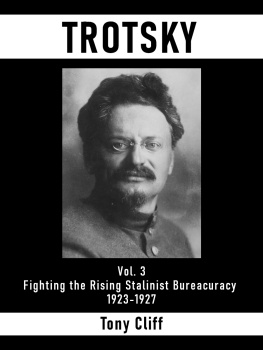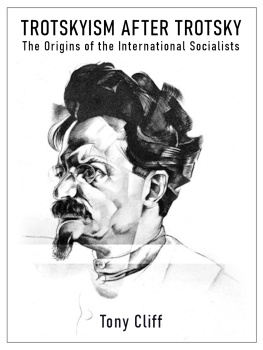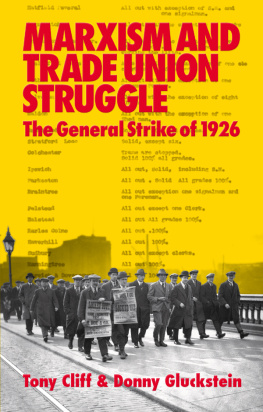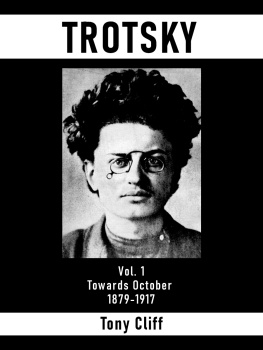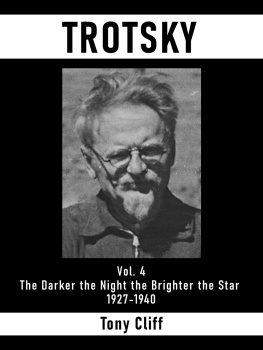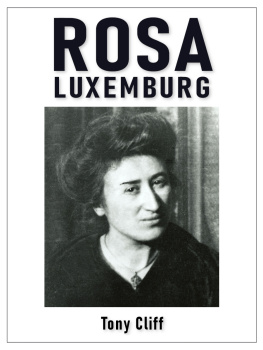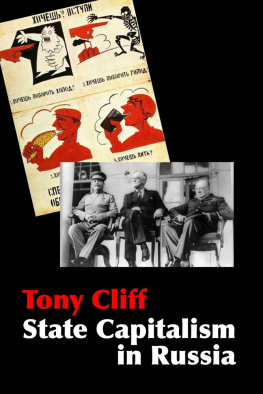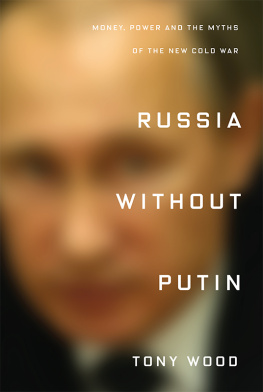Tony Cliff - State Capitalism in Russia
Here you can read online Tony Cliff - State Capitalism in Russia full text of the book (entire story) in english for free. Download pdf and epub, get meaning, cover and reviews about this ebook. year: 1988, publisher: Bookmarks Publications/Marxists Internet Archive, genre: Politics. Description of the work, (preface) as well as reviews are available. Best literature library LitArk.com created for fans of good reading and offers a wide selection of genres:
Romance novel
Science fiction
Adventure
Detective
Science
History
Home and family
Prose
Art
Politics
Computer
Non-fiction
Religion
Business
Children
Humor
Choose a favorite category and find really read worthwhile books. Enjoy immersion in the world of imagination, feel the emotions of the characters or learn something new for yourself, make an fascinating discovery.
- Book:State Capitalism in Russia
- Author:
- Publisher:Bookmarks Publications/Marxists Internet Archive
- Genre:
- Year:1988
- Rating:3 / 5
- Favourites:Add to favourites
- Your mark:
- 60
- 1
- 2
- 3
- 4
- 5
State Capitalism in Russia: summary, description and annotation
We offer to read an annotation, description, summary or preface (depends on what the author of the book "State Capitalism in Russia" wrote himself). If you haven't found the necessary information about the book — write in the comments, we will try to find it.
State Capitalism in Russia — read online for free the complete book (whole text) full work
Below is the text of the book, divided by pages. System saving the place of the last page read, allows you to conveniently read the book "State Capitalism in Russia" online for free, without having to search again every time where you left off. Put a bookmark, and you can go to the page where you finished reading at any time.
Font size:
Interval:
Bookmark:
This text is based on a duplicated internal document of the British RCP entitled The Class Nature of Russia, June 1948.
This version was originally published as Stalinist Russia. A Marxist Analysis in 1955.
Republished as Book I of Russia: A Marxist Analysis in 1964.
Republished with revised chapter order as State Capitalism in Russia in 1974 this title and chapter order has been adopted for the on-line version.
Republished with the Postscript by Chris Harman in 1988 and 1996.
Available in book form from Bookmarks Publications.
A number of obvious typesetting errors have been corrected without comment.
Transcribed & marked up by Dylan Stillwood, Rolf Vorhaug & Einde OCallaghan for the Marxists Internet Archive, and converted to ebook format by Pablo Stern in November 2018.
Cover: Stalin, Roosevelt and Churchill at the 1943 Teheran conference; Shock Brigades poster by Mayakovsky
(Wikimedia Commons)

Born in Palestine to Zionist parents in 1917, Ygael Gluckstein became a Trotskyist during the 1930s and played a leading role in the attempt to forge a movement uniting Arab and Jewish workers. At the end of of the Second World war, seeing that the victory of the Zionists was more and more inevitable, he moved to Britain and adopted the pseudonym Tony Cliff.
In the late 1940s he developed the theory that Russia wasnt a workers state but a form of bureaucratic state capitalism, a theory which has characterised the tendency with which he was associated for the remaining five decades of his life. Although he broke from orthodox Trotskyism after being bureaucratically excluded from the Fourth International in 1950, he always considered himself to be a Trotskyist although he was also open to other influences within the Marxist tradition.
His political legacy is embodied in the British Socialist Workers Party and its sister organisations in the International Socialist Tendency.
The first edition of State Capitalism in Russia was written in 1947 and appeared in duplicated form. It was a time when Stalinism was at its peak: after Russias victory over Nazi Germany, after the Russian occupation of Eastern Europe and before the split between Tito and Stalin. Maos army was spreading quickly over China and was on the verge of total victory.
Forty two years later, in 1989, the Stalinist regimes collapsed in Eastern Europe and then in Russia. The death of the Stalinist economic, social and political order made it possible to test conclusively the validity of the 1947 theoretical analysis of this book. A post mortem reveals the sickness that affected a person when he was alive. The moment of death of a social order can also be its moment of truth.
The perception of the Stalinist regime as a socialist state, or even a degenerated workers state a transitional stage between capitalism and socialism assumed that it was more progressive than capitalism. For a Marxist this had to mean fundamentally that Stalinism was able to develop the productive forces more efficiently than capitalism. However, the deepening crisis in Eastern Europe and USSR cannot be explained except by reference to the slowing down of economic growth in the late 1970s and early 1980s. This led to stagnation and a growing gap between these countries and the advanced West.
In the USSR the annual rate of growth of gross national product was as follows: The first five year plan 19.2 percent (probably an exaggerated figure); 1950-59 5.8 percent; 1970-78 3.7 percent. In 1980-82 it was down to 1.5 percent and over the last ten years there has been a negative rate of growth. Clearly then the productive forces were not developing efficiently.
If the productivity of labour had been more dynamic in Eastern Europe and USSR than in the West, there would be no reason for the rulers of these countries to turn to the market mechanisms of the West. If Eastern European economies were superior then the reunification of Germany, for example, should have seen the flourishing of East German industry in comparison with that of West Germany. In fact the economy of East Germany collapsed after unification. The number of workers employed in East Germany in 1989 was 10 million while today it has fallen to 6 million. Productivity of labour is only 29 percent of the Western level. Thus the East German productivity level, though the highest in Eastern Europe, was still low compared with West Germany and the other advanced economies that it found itself openly competing with after 1989.
If the USSR was a workers state, however degenerated, then when capitalism assaulted it workers would have come to the defence of their state. Even Trotsky, the sharpest critic of Stalinism, always considered it axiomatic that if capitalism attacked the state the workers of the Soviet Union would come to its aid, however corrupt and depraved the bureaucracy dominating it.
But when it came to the crunch in 1989, the workers in Eastern Europe did not defend their state. If the Stalinist state had been a workers state one cannot explain why its only defenders were the secret police forces of the Securitate in Rumania and the Stasi in East Germany, nor why the Soviet working class supported Boris Yeltsin, the outspoken representative of the market.
If the regimes in Eastern Europe and USSR were post capitalist and in 1989 there was a restoration of capitalism, how was the restoration achieved with such astonishing ease?
The 1989 revolutions in Eastern Europe were remarkable for the absence of large scale social conflict and violence. Except for Rumania there was no armed conflict. In fact there were fewer violent clashes in East Germany, Czechoslovakia and Hungary during the fall of these regimes than there were between the police and striking miners in Thatchers Britain of the mid 1980s.
The transition from one social order to another is necessarily accompanied by the replacing of one state apparatus by another. The state machine was hardly touched anywhere in 1989. The Soviet army, the KGB and the state bureaucracy are still in place in Russia, as are many of their equivalents elsewhere. In Poland the military helped to promote the change from Polish state capitalism to a market based economy. General Jaruzelski, the architect of the 1981 coup and the Interior Minister and chief administrator of martial law General Kiszcak, played crucial roles in negotiating the round table with Solidarity and the formation of Mazowieckis coalition government. If a counter revolution had taken place, if a restoration of capitalism had taken place, there should have been a wholesale replacement of one ruling class with another. Instead we witnessed the continuity of the same personnel at the top of society. The members of the nomenklatura who ran the economy, society and state under socialism now do the same under the market.
The collapse of the Stalinist regimes in Russia and Eastern Europe created havoc in the world communist movement and amongst those on the left not armed with a state capitalist understanding. Millions of members and supporters of the communist movement across the world accepted the claim that the Stalinist regime embodied socialism. Millions who belong not to the communist movement but to the socialist movement, also accepted it. This did not only apply to those on the left of the movement. The right wing Fabians, Sidney and Beatrice Webb produced a book entitles
Font size:
Interval:
Bookmark:
Similar books «State Capitalism in Russia»
Look at similar books to State Capitalism in Russia. We have selected literature similar in name and meaning in the hope of providing readers with more options to find new, interesting, not yet read works.
Discussion, reviews of the book State Capitalism in Russia and just readers' own opinions. Leave your comments, write what you think about the work, its meaning or the main characters. Specify what exactly you liked and what you didn't like, and why you think so.

